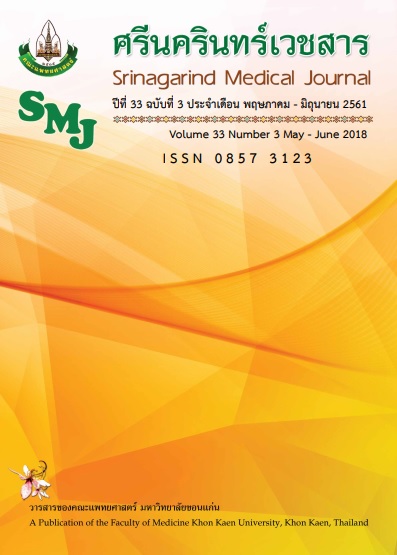The Level of Anti HBs Antibody Titer after Booster Dose in Medical Students
Keywords:
Age, bone healing, fixation, gender, medicationAbstract
Background and Objectives: Hepatitis B Vaccine can prevent hepatitis B viral (HBV) infection by 90-95 %. Health care workers (HCWs) and medical students are at high risk for HBV infection and need to have Hepatitis B immunization. This study aimed to investigate the level of Anti HBS antibody titer and related factors in 1 month after 1 booster dose of hepatitis B vaccine in medical students, Khon Kaen University.
Methods: This study was cross-sectional descriptive study of the level of Anti HBS antibody titer in 1 month after immunization among 212 second year medical students. The data were expressed by descriptive statistics. Multiple variables were analyzed by Multiple logistic regression.
Results and conclusion: Sample size was 212 medical students. 54.94% are male and 49.06% are female. 66.04% were born in 1991. Average age is 19.84 years. 85.85% didn’t have underlying diseases. 76.42% could not remember their immunization history. Anti HBS antibody titer level in 1 month after 1 booster dose of hepatitis B vaccine was positive by 60.85%. 47.64% had Anti HBS antibody titer level higher than ≥ 100 mIU/mL. The analysis of factors affecting anti HBS antibody titer level found no differences among sex, age, birth year, underlying diseases and immunization history. It was concluded that appropriate HBV vaccination model should followed by assessment of hepatitis B profile.
ระดับภูมิคุ้มกันต่อเชื้อไวรัสตับอักเสบบีหลังการฉีดวัคซีนกระตุ้นภูมิคุ้มกันในนักศึกษาแพทยศาสตร์
สายสมร พลดงนอก1, พิศาล ไม้เรียง2, ปิยธิดา คูหิรัญญรัตน์3, พวงผกา สาดี นิลเซน4, กาญจนศรี สิงห์ภู่5
1 หน่วยสร้างเสริมสุขภาพ งานเวชกรรมสังคม โรงพยาบาลศรีนครินทร์ คณะแพทยศาสตร์ มหาวิทยาลัยขอนแก่น
2 ภาควิชาอายุรศาสตร์ คณะแพทยศาสตร์ มหาวิทยาลัยขอนแก่น
3 ภาควิชาเวชศาสตร์ชุมชน คณะแพทยศาสตร์ มหาวิทยาลัยขอนแก่น
4 หน่วยภูมิคุ้มกันวิทยา โรงพยาบาลศรีนครินทร์ คณะแพทยศาสตร์ มหาวิทยาลัยขอนแก่น
5 งานเวชกรรมสังคม โรงพยาบาลศรีนครินทร์ คณะแพทยศาสตร์ มหาวิทยาลัยขอนแก่น
หลักการและวัตถุประสงค์: วัคซีนป้องกันโรคไวรัสตับอักเสบบี ช่วยกระตุ้นการสร้างภูมิคุ้มกันโรคมีประสิทธิภาพในการป้องกันโรคสูงถึงร้อยละ 90–95 บุคลากรทางการแพทย์และนักศึกษาแพทย์มีความเสี่ยงสูงต่อการได้รับเชื้อไวรัสตับอักเสบบี จึงจำเป็นต้องได้รับการสร้างเสริมภูมิคุ้มกันโรคไวรัสตับอักเสบบี การศึกษานี้มีวัตถุประสงค์ เพื่อศึกษาระดับภูมิคุ้มกันโรคไวรัสตับอักเสบบี และปัจจัยที่มีความสัมพันธ์ หลังได้รับการฉีดวัคซีนกระตุ้นภูมิคุ้มกันโรคเข็มที่ 1 เป็นเวลา 1 เดือน ในนักศึกษาแพทยศาสตร์ คณะแพทยศาสตร์ มหาวิทยาลัยขอนแก่น
วิธีการศึกษา : เป็นการศึกษาเชิงพรรณนาภาคตัดขวาง (Cross-sectional descriptive study) เพื่อศึกษาระดับภูมิคุ้มกันโรคหลังได้รับการฉีดวัคซีนกระตุ้นภูมิคุ้มกันโรคไวรัสตับอักเสบบี จำนวน 1 เข็ม เป็นเวลา 1 เดือน ในนักศึกษาแพทย์ ชั้นปีที่ 2 ปีการศึกษา 2554 คณะแพทยศาสตร์ มหาวิทยาลัยขอนแก่น จำนวน 212 ราย วิเคราะห์ข้อมูล โดยใช้สถิติเชิงพรรณนา และหาความสัมพันธ์ของปัจจัยที่มีผลต่อระดับภูมิคุ้มกันโรค โดยใช้สถิติ Multiple logistic regression
ผลการศึกษา : พบว่าจากประชากรทั้งหมด 212 ราย เป็นเพศชาย ร้อยละ 54.94 ส่วนใหญ่ร้อยละ 66.04 เกิดในปี พ.ศ.2534 อายุเฉลี่ย 19.84± 0.43 ปี ร้อยละ 85.85 ไม่มีโรคประจำตัว และร้อยละ 76.42 จำประวัติการฉีดวัคซีนป้องกันไวรัสตับอักเสบบีไม่ได้ ระดับภูมิคุ้มกันโรคไวรัสตับอักเสบบีหลังฉีดวัคซีนกระตุ้นภูมิคุ้มกัน ส่วนใหญ่ร้อยละ 60.85 มีระดับภูมิคุ้มกันโรคเป็นบวก โดยร้อยละ 47.64 มีระดับ Anti-HBs ≥ 100 mIU/mL การวิเคราะห์ปัจจัยที่มีผลต่อระดับภูมิคุ้มกันโรคไวรัสตับอักเสบบีพบว่าเพศ อายุ ปีที่เกิด โรคประจำตัว และประวัติการฉีดวัคซีนไม่มีผลต่อระดับภูมิคุ้มกัน
สรุป: ระดับภูมิคุ้มกันโรคหลังได้รับการฉีดวัคซีนกระตุ้นภูมิคุ้มกันโรคไวรัสตับอักเสบบี จำนวน 1 เข็ม เป็นเวลา 1 เดือน พบผู้ที่ระดับภูมิคุ้มกันโรค (Anti-HBs) ≥ 100 mIU/mL ร้อยละ 47.64 และพบว่า ปัจจัยทั้งเพศ อายุ ปีที่เกิด โรคประจำตัว และประวัติการฉีดวัคซีน ไม่มีผลต่อระดับภูมิคุ้มกันในนักศึกษาแพทย์ ดังนั้น รูปแบบการสร้างเสริมภูมิคุ้มกันโรคไวรัสตับอักเสบบีที่เหมาะสม จึงจำเป็นต้องกำหนดให้มีการตรวจคัดกรองภาวะการมีภูมิคุ้มกันโรคไวรัสตับอักเสบ บีก่อนการฉีดวัคซีน
References
2. Hamborsky J, Kroger A, Wolfe C, editors. Epidemiology and prevention of vaccine-preventable diseases. 13th ed Washington, DC: Centers for Disease Control and Prevention; 2015.
3. Schillie S, Murphy TV, Sawyer M, Ly K, Hughes E, Jiles R, et al. CDC guidance for evaluating health-care personnel for hepatitis B virus protection and for administering postexposure management. MMWR Recomm Rep 2013; 62 (RR-10): 1–19.
4. Lewis JD, Enfield KB, Sifri CD. Hepatitis B in healthcare workers: Transmission events and guidance for management. World J Hepatol 2015; 7: 488–97.
5. Chathuranga LS, Noordeen F, Abeykoon AMSB. Immune response to hepatitis B vaccine in a group of health care workers in Sri Lanka. Int J Infect Dis 2013; 17: e1078-9.
6. สำนักโรคติดต่อทั่วไป กรมควบคุมโรค. คำแนะนำการให้วัคซีนสำหรับบุคลากรทางการแพทย์และสาธารณสุข. นนทบุรี: สำนัก; 2555.
7. World Health Organization. Hepatitis B. Fact sheet. [online]. 2017Jul [cited Jan 29, 2018]. Available from: http://www.who.int/mediacentre/factsheets/fs204/en/
8. จีรนันท์ จันทร์เมฆา. ความชุกและปัจจัยเสี่ยงของภาวะภูมิคุ้มกันในโรคไวรัสตับอักเสบบีในบุคลากรทางการแพทย์ไทย. ศรีนครินทร์เวชสาร 2554; 26: 112–9.
9. McMahon BJ, Dentinger CM, Bruden D, Zanis C, Peters H, Hurlburt D, et al. Antibody levels and protection after hepatitis B vaccine: results of a 22-year follow-up study and response to a booster dose. J Infect Dis 2009; 200: 1390–6.
10. Sarmast Shooshtari MH, Makvandi M, Rasti M, Neisi N, Rastegarvand N, Pouremamali A, et al. Evaluation of hepatitis B surface antibody and specific gamma interferon response in health care workers after vaccination. Jundishapur J Microbiol 2015; 8: e13801.
11. กุลกัญญา โชคไพบูลย์กิจ, เกษวดี ลาภพระ, จุฑารัตน์ เมฆมัลลิกา, ฐิติอร นาคบุญนำ, อัจฉรา ตั้งสถาพรพงษ์. ตำราวัคซีนและการสร้างเสริมภูมิคุ้มกันโรค ปี 2556. นนทบุรี: สำนักโรคติดต่อทั่วไป กรมควบคุมโรค; 2556.
12. Duca P, Del Pont JM, D’Agostino D. Successful immune response to a recombinant hepatitis B vaccine in children after liver transplantation. J Pediatr Gastroenterol Nutr 2001; 32: 168–70.
13. Boonsirichan R, Duangmanee D, Klaewkasikij P, Chantanalage R, Suebklay S, Supawattanabodee B. Efficacy of Hepatitis B Vaccination in Personnels of BMA Medical College and Vajira Hospital. Vajira Med J 2011; 54: 9–18.
14. Fink AL, Klein SL. Sex and Gender Impact Immune Responses to Vaccines Among the Elderly. Physiol Bethesda Md 2015; 30: 408–16.




